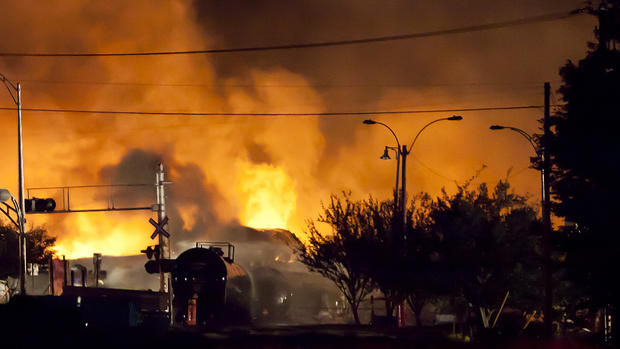Explosive train disasters prompt federal emergency order for rail oil transport
A new emergency order is in effect for cargo trains. Federal regulators issued the rules Tuesday, following a series of explosive rail accidents involving crude oil. They want strict testing and tighter safety regulations.
The Department of Transportation says more than half of the crude from one of the fastest-growing oil fields in the country may have been misclassified, leading to its unsafe packaging and transportation, CBS News Jeff Pegues reported.
Last July, more than 70 oil
tankers derailed and exploded in Lac-Megantic, Quebec, causing a massive fire
that flattened much of the small town center. The accident killed 47 people and
destroyed nearly 40 buildings, causing more than $1 billion in damage.
Those tankers were filled with oil pulled from North Dakota's Bakken shale -- now the focus of a federal emergency restriction.
DOT found that Bakken shale oil was misclassified and carried in tankers that lacked safety measures -- posing an "imminent hazard." The order mandates testing of oil so it can be safely transported.
Recent studies have suggested that Bakken oil is more combustible and dangerous than other kinds of crude. Within six months of the Quebec incident, explosive derailments involving the crude occurred in Alabama and North Dakota.
John Hofmeister, former president of Shell Oil, said, "These accidents we've had are testimony to the risks associated with moving oil by rail when you have oil that is such a volatile mix as this kind of oil is."
According to the Association of American Railroads, three percent of crude tankers lack the protective measures to safely carry Bakken oil.
"We learn as we go, and we respond appropriately to what we learn," Hofmeister said. "There's a voluntary effort underway by the industry to deal with the construction of the rail cars. And I think that will take place in due course."
Still, Hofmeister said he believes these latest sanctions are a step in the right direction.
"We've been transporting oil on rail cars for well over 100 years," he said. "But there have been accidents, there have been incidences. The industry, and the government have to work together to try and find ways to de-risk the process."
The emergency order is effective immediately, and if crude suppliers do not abide by the regulations, they could be subject to massive fines and criminal prosecution.
